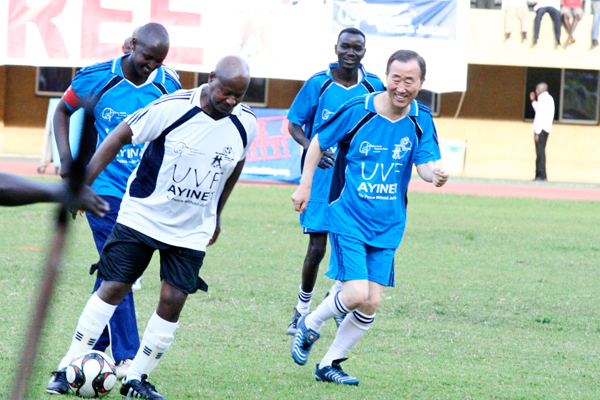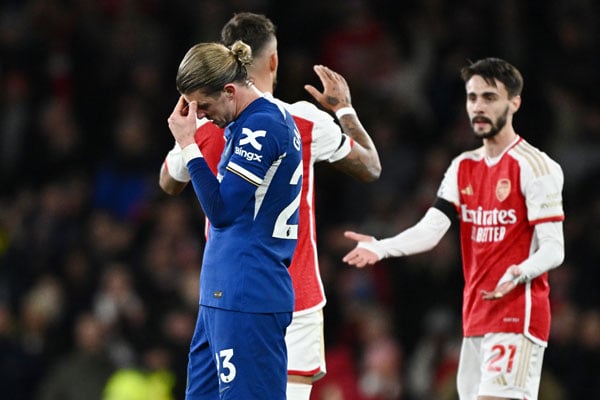Sports under M7: From amateur to semi-pro, pro

Keeping Eyes On The Ball. President Museveni (with the ball) and UN Secretary General Ban Ki-moon (R) play football with war victims at Mandela National Stadium - Namboole in 2010. The No.1 Citizen has told all and sundry that he is very passionate about sports but his actions and attention to it have somewhat made many modern sportsmen believe else. PHOTO/ISMAIL KEZAALA
What you need to know:
All Sport. Even if not much of this success can be linked directly to government’s investment in sports, athletes have gone from amateur to semi-professional, and even professional. What hasn’t changed is the tokenism.
By 1986, Uganda was had been a superpower in sports largely due to the success of the 1970s when President Idi Amin Dada directly got involved.
As a former national swimmer, boxer and rugby player, Amin had represented Uganda. That gave him an inside lane that made it obvious that sportspersons got preferential treatment from the highest office.
John Akii-Bua won Uganda’s first Olympic Gold in 1972, Cranes reached the 1978 Africa Cup of Nations and amateur boxers here were among the best in the world. Most of this wasn’t because of a system. The relationship between the sports subsector and government wasn’t defined. It was down to what the president loved.
Killed
Upon his overthrow in 1979, many of sportsmen who belonged to the armed forces, especially footballers, fled to exile while others were killed fighting in the war. All this time, the 1964 National Council of Sports (NCS) Act defined it as ‘amateur and voluntary’ without the supporting regulations that certify the law.
Predictably, sports plummeted post-Amin save for boxing where John ‘Beast’ Mugabi delivered Silver at the 1980 Olympic Games in Moscow, Russia.Most national teams disappeared as competitive units in the early years of President Yoweri Museveni’s reign which started in 1986 even if he largely maintained the undefined relationship hinged on tokenism.
Customs
Successful sports personalities still get the customary handshake, flag-offs, luncheons and dinners. There hasn’t been a clear sports agenda to guide what government does. It depended on the mood of an individual.
The archaic 1964 law, inadequate infrastructure and funding gaps have remained key detriments to sports development even as the sector has evolved to a multi-billion industry globally over the past 35 years.
Under colonialism, the Lugogo Indoor and Nakivubo Stadiums were built in addition to smaller regional facilities. The latter are largely in sorry state while Nakivubo’s ongoing reconstruction is anyone’s guess. The major addition is the Mandela National Stadium, Namboole which was opened in 1997. It was negotiated for under Amin but never built due to insecurity.
No facilities
Only the restoration of peace enabled China to invest US$36m into the project. Its decline since inauguration means that Uganda has no internationally-recognized national facility.
Also, the structured funding of sports has improved significantly from a few millions to Shs26b, 10b of which goes to football. This came with the signing of the 2014 Statutory Instrument to effect the 1964 NCS Act.
In the midst of all this, Ugandan sportspersons, working under a law that defines their talent as amateur and voluntary, have amassed lots of wealth.
Even if not much of this success can be linked directly to government’s investment in sports, Ugandan sportspersons have gone from amateur to semi-professional, and even professional. What hasn’t changed is the tokenism.




